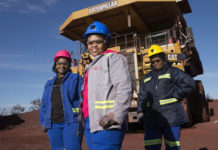
[miningmx.com] — HEAVEN knows what the scores of international investors at this week’s Coaltrans conference in Johannesburg are making today of the debate about nationalisation of South Africa’s mines.
They’re probably wondering why they’re sitting eating mints and sipping bottled water in the dim conference room – made dimmer by the conversation – instead of relaxing outside in the lovely winter sun, perhaps for the last time in South Africa. Afterall, the next Coaltrans conference is in Mozambique which is desperate for foreign capital and has loads of coal prospects.
The issue of nationalisation was raised by Bridgette Radebe, chairperson of junior miner Mmakau Mining and head of Samda, a small mining business association. Radebe said that the country’s mining industry should “embrace the debate’ of nationalisation rather than decry it.
Radebe was, of course part of the team that in 2002 helped craft the new mining charter which after an initial draft, leaked to me which I then published to quite unexpected share price carnage on the JSE, effectively called for nationalisation of the industry. Fast forward a decade, and Radebe said the mining charter was not working.
“Don’t be afraid of debating what the majority of South Africa want us to debate,’ said Radebe of mines nationalisation. “We have to take stock. Is the (mining) charter working effectively?’ said Radebe. “If we don’t do this, we could end up like Zimbabwe.’
Of course, the ANC has yielded to its youth wing’s calls that nationalisation become a topic for debate at its 2012 national conference. This was after first dismissing it as “not policy’. Since then, it’s emerged the ANC Youth League wants nationalisation without compensation and wants to include banks into the mix as well. Nationalisation can’t work without banks, etc etc..
There are many, many problems with South Africa’s mining laws, mostly around implementation: such as the thorny issue of granting mining licences and exploration permits timeously and fairly, and the like. There’s also the question of how mining licences, once granted, get used.
Executive chairperson of Kuyasa Mining Ayanda Bam, among the first of black-owned mining companies to enter the industry (even before legislation asked for it), said the permit system had been abused. He’s right. “There’s been a lot of reselling of permits for huge sums of money,’ said Bam.
“The danger of this is that the economy will not be transformed. But we are the main culprits,’ he said of the black mining enterpreneurs. “Very little has changed expect that some people have very large bank balances,’ he said.
He also identified access to capital as a major blocker to the success of black business. Black mining entrepreneurs have been relegated to the role of “partners” in terms of the mining charter, which asks existing companies to create 26% empowerment. “If you don’t have the balance sheet, your stake will be gone; you’ll be left with a 2% stake,’ said Bam.
But is nationalisation the natural answer?
Nationalisation of any industry is generally anti-business, which will have particular ramifications for financiers of the mining industry who are called upon to broker and finance multi-billion rand deals. One need only look at Dan Marokane’s comments on Tuesday. Marokane, chief commercial officer at Eskom, said South Africa’s coal mining industry needed to invest R100bn in new coal production if Eskom were to “keep the lights on’.
Why Anglo American would approve its R10bn to R15bn New Largo coal mine, which is to supply coal to Eskom’s Kusile power station, in the teeth of a debate about nationalisation is anyone’s guess.
New Largo has to compete for capital from Anglo’s balance sheet with a host of other projects. For Anglo American shareholders – most of them foreign – the mine doesn’t particularly have to get built – not if a better one, which could make more money, can get built elsewhere.
What’s certain is that if New Largo doesn’t get built, then there’s no new power from Kusile and therefore less power for the South African economy at large which is as good as condemning the country’s mining industry to a slow death.











